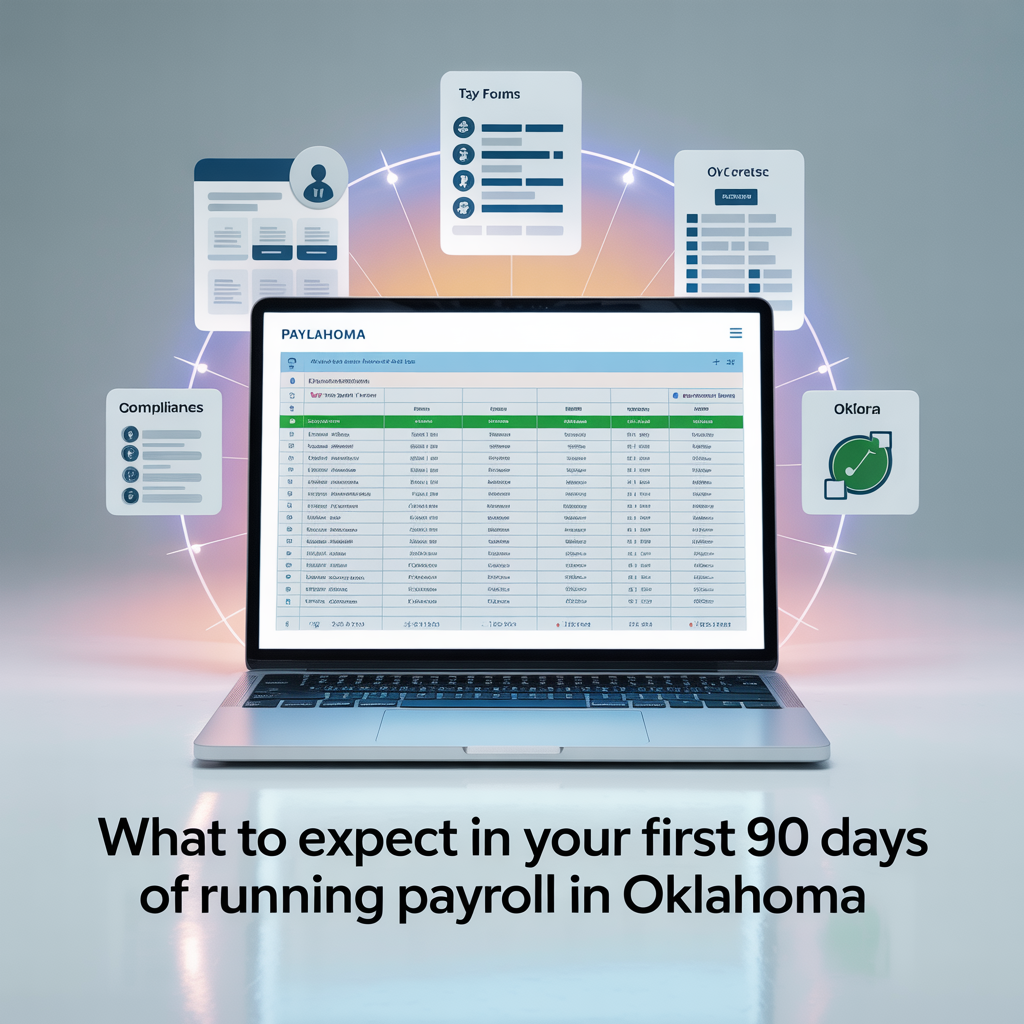What to Expect in Your First 90 Days of Running Payroll in Oklahoma

What to Expect in Your First 90 Days of Running Payroll in Oklahoma
Running payroll for the first time can feel overwhelming, especially with all the forms, deadlines, and filings. But don’t worry — you're not alone in this. As a small business owner in Oklahoma, you're likely facing a long list of tasks that include compliance with both Oklahoma state requirements and federal tax laws.
In this post, we’ll break down the essential payroll tasks you’ll need to tackle in your first 90 days as a new employer in Oklahoma — from setting up your payroll system to filing your first tax returns.
Step 1: Payroll Setup and System Integration
Gather Information
Before you even run your first payroll, you’ll need to gather some basic information:
- EIN (Employer Identification Number): This is required for filing taxes and paying employees. You can apply for this online through the IRS website.
- State Unemployment Tax (OESC): Register with the Oklahoma Employment Security Commission (OESC) for state unemployment tax purposes.
- W-4 Forms: Make sure you have W-4 forms for each employee, so you can withhold the correct federal income tax.
- Pay Schedule: Determine your pay schedule (weekly, bi-weekly, monthly) and communicate this clearly to your team.
Step 2: First Payroll Run
Once your information is set up, you’ll need to run your first payroll. If you’re using a system like iSolved, the software will help you manage the calculations for wages, tax withholdings, and other deductions.
Key Components:
- Gross Pay: Total earnings before deductions.
- Deductions: This includes federal and state taxes, Social Security, Medicare, and any other voluntary deductions (health insurance, retirement contributions, etc.).
- Net Pay: The amount your employees take home after deductions.
Tip: iSolved helps by automatically calculating the tax withholdings and managing the submission to the IRS and state authorities.
Step 3: Filing Payroll Taxes
One of the most crucial tasks is filing payroll taxes correctly. The IRS and the Oklahoma Tax Commission (OTC) require businesses to submit taxes regularly.
Here’s a basic breakdown of what you’ll need to file during your first 90 days:
- IRS Form 941: This is the quarterly report of federal income and payroll taxes withheld.
- OESC Form UI-3/40: This is your Oklahoma state unemployment tax form, filed quarterly.
- IRS Form 940: This is the annual FUTA (Federal Unemployment Tax Act) form that employers need to submit by the end of the year.
Tip: Missing or incorrect filings can lead to penalties. It’s essential to stay on top of deadlines and keep accurate records.
Step 4: Submit Your Payments
In addition to filing your reports, you also need to make sure that the appropriate tax payments are sent to the IRS, OTC, and other relevant agencies.
Key Deadlines:
- Federal Payroll Taxes: These must be paid according to your pay schedule (monthly, semi-weekly, etc.).
- State Payroll Taxes: Payments to Oklahoma's OESC are also due on a quarterly basis.
Tip: If you are using an automated payroll service like iSolved, tax deposits can be handled automatically, saving you the hassle.
Step 5: Employee Records and Reporting
As you continue processing payroll, make sure you stay up to date with all employee records. This includes:
- Employee Identification: Keep all W-2, W-4, and I-9 forms updated.
- PTO and Benefits Tracking: If you offer paid time off (PTO) or other benefits, ensure these are tracked accurately from the beginning.
At the end of the year, you will need to issue:
- W-2 Forms: These are for your employees, showing their total income and taxes withheld.
- 1099 Forms: If you have independent contractors, you will need to issue these forms as well.
Step 6: Review and Plan for Year-End
By the 90-day mark, you should already be thinking about year-end tax preparation:
- Reconcile Payroll: Ensure all records match, and all taxes are paid.
- Review Financials: If you’re new to accounting and payroll, now’s the time to evaluate your processes and seek professional guidance for improvement.
It’s important to understand that year-end tax filing involves not just a clean payroll system, but also a comprehensive financial strategy to reduce liability and maximize savings for the next year.
FAQs – First 90 Days of Payroll in Oklahoma
Q: How do I know I’ve completed everything correctly?
We recommend working with a CPA to ensure you stay compliant and reduce the risk of errors. If you’ve set up your payroll system correctly, checked your filings, and stayed on top of payments, you’ll be in a good position.
Q: Do I need to file taxes every month?
It depends on your pay schedule and the size of your payroll. Typically,
Form 941 is filed quarterly, but payments to the IRS and state may be due more frequently.
Q: Can I file all payroll taxes manually?
Yes, but it’s complex and prone to human error. Many businesses prefer to use automated systems like
iSolved, which can help you file taxes, issue payments, and stay compliant automatically.
Q: What happens if I miss a payroll tax filing deadline?
You may be subject to penalties, including interest on late payments. It's best to stay organized and use a system or service that reminds you of due dates.
Ready to Get Payroll Right from Day One?
At Boulanger CPA, we help Oklahoma City businesses run payroll smoothly from the start. We’ll make sure your first 90 days go smoothly and set you up for long-term success.
Schedule a Free Payroll Consultation
See Our Payroll Pricing

Marc Boulanger
Marc views his accounting business as an extension of his family. And while he holds a Bachelor of Arts in Business Administration and Accounting and a Masters of Science in Accounting, he values traveling around the country with his wife of 30 years and 5 kids, Marc learned that communication is the key to effective team work.


